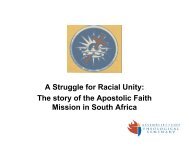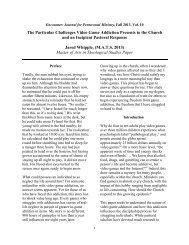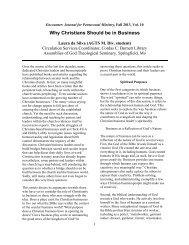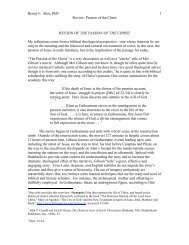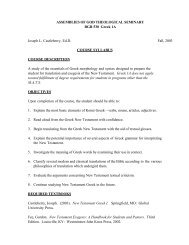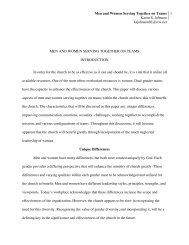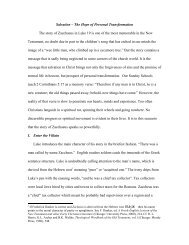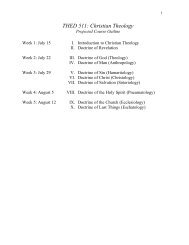Encounter: Journal for Pentecostal Ministry - Assemblies of God ...
Encounter: Journal for Pentecostal Ministry - Assemblies of God ...
Encounter: Journal for Pentecostal Ministry - Assemblies of God ...
Create successful ePaper yourself
Turn your PDF publications into a flip-book with our unique Google optimized e-Paper software.
loans to poor individuals can reverse the<br />
poverty <strong>of</strong> millions and confound the<br />
wisdom <strong>of</strong> the macro-oriented global<br />
banking institutions. 16 As <strong>Pentecostal</strong>s, we<br />
should be at the <strong>for</strong>efront <strong>of</strong> community<br />
trans<strong>for</strong>mation.<br />
Implications <strong>for</strong> Traditional Bifurcation<br />
Given my personal life context, I find it<br />
difficult to entertain or accommodate a<br />
theology that attempts to separate the <strong>for</strong>mal<br />
verbal presentation <strong>of</strong> the gospel from the<br />
engagement <strong>of</strong> people in the context <strong>of</strong> their<br />
social ills, physical needs, and suffering.<br />
James, the brother <strong>of</strong> Jesus, made this clear,<br />
“If a brother or sister is without clothing and<br />
in need <strong>of</strong> daily food, and one <strong>of</strong> you says to<br />
them, ‘Go in peace, be warmed and be<br />
filled,’ and yet you do not give them what is<br />
necessary <strong>for</strong> their body, what use is that?”<br />
(James 2:14-17).<br />
Since we first began to present classes in<br />
social justice here at the Seminary, Dr.<br />
Klaus has presented to each <strong>of</strong> these classes<br />
the theological underpinnings <strong>for</strong> “a<br />
compassion rooted in the gospel that<br />
trans<strong>for</strong>ms.” As he explored the historical<br />
roots <strong>of</strong> today’s Western bifurcation, he<br />
provided me, <strong>for</strong> the first time, an insight<br />
into what has been referred to by Western<br />
Church historians as “the Great Reversal.”<br />
In essence, Evangelicals in the early<br />
twentieth century distanced themselves from<br />
modernism, liberal theology, and what came<br />
to be derisively referred to as “the social<br />
gospel.” It included their reaction to such<br />
significant cultural impacts as the Scopes<br />
Monkey Trial, Darwinism, and the rise <strong>of</strong><br />
European theological liberalism that<br />
denounced the inspiration <strong>of</strong> Scripture, the<br />
virgin birth, and the deity <strong>of</strong> Christ. 17<br />
6<br />
Understanding the historical development <strong>of</strong><br />
this bifurcation has provided me with deeper<br />
insight into the continuing reticence <strong>of</strong> the<br />
Western Church to embrace the holistic<br />
message that once characterized the church<br />
<strong>of</strong> the nineteenth century. I now better<br />
understand the underlying fear <strong>of</strong> slipping<br />
back into an emasculated “social gospel”<br />
where therapeutic ef<strong>for</strong>ts to help people<br />
“self-actualize” replaced the message <strong>of</strong><br />
salvation.<br />
However, over the last century there have<br />
been significant shifts in global Christianity.<br />
The majority <strong>of</strong> the Christian Church no<br />
longer lives in this Western Church. At the<br />
beginning <strong>of</strong> the twentieth century only ten<br />
percent <strong>of</strong> Christians lived outside the West;<br />
at the start <strong>of</strong> the twenty-first century,<br />
seventy percent <strong>of</strong> Christians live in the<br />
Majority world. We must now begin to<br />
recognize that what was once the periphery<br />
<strong>of</strong> the Church has become the center, and<br />
the center has become the periphery. 18<br />
In addition to this massive shift away from<br />
the West, the Majority world has matured,<br />
but does not share the same history <strong>of</strong><br />
bifurcation as the Western Church. In<br />
Africa, at the very first charter meeting <strong>of</strong><br />
the <strong>Assemblies</strong> <strong>of</strong> <strong>God</strong> leadership<br />
association, they called <strong>for</strong> the immediate<br />
establishment <strong>of</strong> a division <strong>for</strong> social<br />
concern because the future <strong>of</strong> the Church in<br />
Africa required this. 19 Two <strong>of</strong> my colleagues<br />
at AGTS have ably traced the tension in<br />
<strong>of</strong>ficial policy on the primacy <strong>of</strong> evangelism<br />
over social action within the AG. 20 These<br />
works demonstrate that even during the most<br />
evangelistically oriented periods <strong>of</strong> AG<br />
history, social programs have been widely



